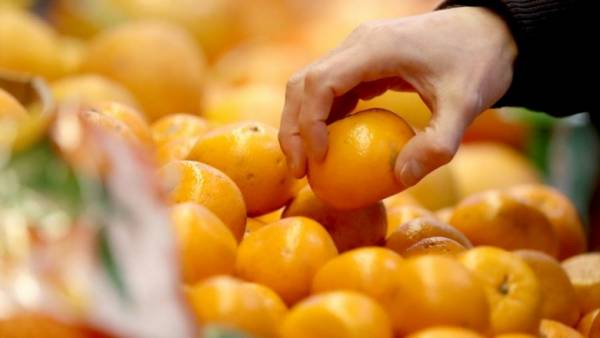Forbidden fruit
How to protect yourself from dangerous vegetables and fruits.

Spring beautiful and fragrant vegetables, fruits and berries literally haunt a potential buyer. Sell them on every corner, the shelves bending from the excess of goods, and the market vendors are actively encouraging clients to try a “juicy peach”. But do not forget that “beautiful” does not mean useful. So, on Friday, may 18, the CPS was informed about the poor quality of vegetables. It turned out that in the first quarter of this year, the recognized 56 tons. Of these, nearly 13 tons was brought from abroad. In the end, all goods removed from sale. Last year, the Agency rejected more than 680 tons. What are the risks of buying harmful, but such tempting food, and how to understand that the products are dangerous — in the material of the portal iz.ru.
Mix with paraffin
According to the adopted in the country Recommendations for rational norms of food consumption, every Russian is required annually 140 kg of vegetables and melons (e.g., cabbage, tomato, cucumber, carrots, beets and onions), 90 kg of potatoes and 100 kg of fruits and berries. These recommendations were approved by the Ministry of health, and, as assured in the Department, meet the modern requirements of a healthy diet. In addition, they can be oriented for planning the volume of production in agribusiness.
Fruits and vegetables rich in macro and microelements and vitamins. They strengthen immunity and help in prevention of several diseases. However, in pursuit of benefits we should not forget about the harm that may cause the wrong products.
The danger lies in the inadequate use of chemicals for growing vegetables and fruits. Writes “Agrostroi” today producers apply pesticides, including such groups of substances as herbicides that protect against weeds, and fungicides (prevent fungal and other diseases) and insecticides (insect pests). With the help of pesticides could reduce the effort to create the best conditions for the growth of crops and save the crops.
With the help of various drugs fruits also give an attractive appearance and ensure their preservation. For this purpose, preservative (E-200 to E-299), for example aromatic hydrocarbons, biphenyl (E-230). It has an antibacterial effect — does not develop mold, mildew and rot, however, is a carcinogen. Diphenyl is toxic to kidneys, liver, nervous and cardiovascular systems, can cause skin diseases. This stuff does not smell and it is colourless, but has one distinctive feature — the fruits become sticky. Safe daily concentration of diphenyl — 0.5 mg/kg of body weight.
Sulfur dioxide also extends the life of the product, but “kills” her vitamins and minerals. Its application is evidenced by the bright glossy surface of the fruit. Sensitive nose can detect sulfur odor.
Still mostly fruit — apples, pears and citrus — covered with a mixture of wax, paraffin wax and sorbic acid. This “mix” gives an antibacterial effect and is a preservative. However, sorbic acid may disrupt the gastrointestinal tract.
Moreover, herbal products are treated with ethylene. It is used when the product must “ripen”. Easily perishable vegetables, fruits and berries are harvested still green, they bring to the warehouse and there is artificially brought to a state of full ripeness. The ethylene on the fruit surface remains so that the substance caused harm to humans. But remember that if a product looks Mature, does not mean that it is. And this fact naturally affects the amount of harmful substances.
As told iz.ru a representative of the medical environment, the obvious danger and nitrates that are contained in used by farmers as fertilizers. Nitrates are absorbed by the fetus and can cause various diseases.
According to the doctor, from eating untested vegetables, fruits or berries, there is a risk of poisoning. But the person threatening and other diseases: can develop gastritis, or enterocolitis (inflammation of the small and large intestines), to weakness. In this case you need to turn to doctors for comprehensive treatment.